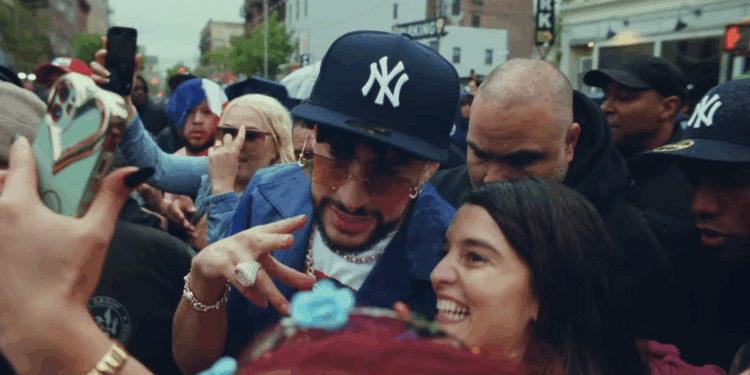Even President Trump has thrown his two cents into the debate over the selection of Puerto Rican superstar Bad Bunny to headline this NFL season’s Super Bowl halftime performance, calling the decision “absolutely ridiculous.”
It’s true, Bad Bunny is a somewhat curious choice for an organization obsessed with branding, given he has criticized Trump’s political agenda and refused to tour on the U.S. mainland due to supposed fears of Immigration and Customs Enforcement raids at his shows. Then again, it wouldn’t be Bad Bunny’s first time performing at the Super Bowl. In 2020, he appeared onstage with Jennifer Lopez, Shakira, and J Balvin, an unabashed attempt to appeal to (and broaden) the NFL’s Latino audience base.
Yet what American audiences may not realize about the Latin music industry is that its biggest names are almost all woke. Why that is says a lot about the context and conflicts of Latin American culture and politics and how those conflicts seep into the United States.
Wokeness Among Latin American Stars
Bad Bunny’s influence, both in Latin culture and the wider world, is hard to overstate. He was the most-streamed artist on Spotify for three consecutive years (2020-2022) and the second most-streamed artist globally as of late 2025. He’s been labeled “the most popular American on Earth,” not only for his music but for his branching out into professional wrestling, acting (including several appearances on SNL), and fashion. He’s also outspokenly leftist, endorsing Democrat candidates, promoting LGBT causes, and attacking Trump’s immigration policies.
But he’s hardly alone. Just consider the Latin stars who shared the stage with him at Super Bowl LIV. Shakira, a longtime advocate for so-called social justice, is a proponent of the LGBT cause and was even scheduled to perform at a World Pride event in Washington, D.C., earlier this year until it was canceled for logistical difficulties. She has criticized the Trump administration’s immigration policies and publicly celebrated Biden’s 2020 election victory. J Balvin, one of the most-streamed artists in the world, is both an advocate for illegal immigrants (having once been an illegal immigrant here) and a vocal ally of the LGBT cause. J. Lo, who stumped for Biden, has been acclaimed as a “full gay icon.”
The same can be said for the other biggest names in Latin American music today. Karol G — Billboard’s 2024 “Woman of the Year” and one of the most popular Latin musicians today — is an outspoken feminist, LGBT advocate, and critic of U.S. Immigration and Customs Enforcement. Maluma and Anuel AA, both left-wing social activists, have publicly declared their support for people who identify as LGBT, while Marc Anthony and Ricky Martin were unabashedly pro-Kamala Harris in the last presidential election. Even Nicky Jam, briefly a supporter of Trump, withdrew his endorsement.
Why Latin Pop Stars Are So Left-Wing
The fact that the vast majority of the most popular stars in Latin music are hardcore lefties might surprise some Americans. Isn’t Latin society, influenced by the Catholic Church and increasingly evangelicalism, more culturally conservative than our increasingly left-wing and secular culture? Isn’t Latin culture more likely to celebrate traditional moral norms? Yes and no.
Having spent the last six years traveling throughout Latin America — including living in Panama for two of them — I have learned that Latin culture is far more stratified than the United States. Historically, Latin countries were divided between an entrenched, often self-aggrandizing conservative elite of primarily European heritage that often enjoyed support from ecclesial authorities, and disenfranchised mestizo and indigenous populations prone to leftist and even Marxist rebellion.
Unsurprisingly, popular Latin music (and art more generally) has thus historically been a means of criticizing corrupt and oppressive regimes. This is similar to the role art plays in the United States in pushing boundaries, but in Latin America, it is more accentuated because almost all Latin countries lack a large or strong middle class that promotes respectable bourgeois norms that appeal across classes, and typically softens anti-authority tendencies among lower-income citizens because they know that virtue and hard work are a means of climbing the socioeconomic ladder. Absent participating in illegal activities such as narcotics, it’s comparatively much more difficult to get out of poverty in most Latin countries (in large part because Marxist overreactions to corrupt regimes have only made things worse).
Also similar to the United States, antagonism toward authority manifests itself not just politically but culturally. Thus, even though most Latin musicians grew up with at the very least cultural Catholicism, a mindset of resistance easily transfers toward sexual norms and other social issues. This is why so many Latin musicians, even male ones, are typically critical of the machismo qualities of their own culture, and why they almost all line up in favor of the LGBT movement. It’s all part of the resistance. And, if we are talking about border policy and immigration, it’s easy to demonstrate solidarity with illegal Latino immigration and attack those terrible “Yanquis,” who are historically associated with so many of the Latin world’s problems.
Where Culture Meets Politics
Of course, the above is a generalization and complicated in the United States by the fact that many Latin American immigrants to the United States were either part of the conservative and wealthier class of their native country, fled authoritarian leftist regimes in favor of the American dream, or, through hard work and ingenuity, have successfully entered the American middle class. Our nation is full of such success stories, manifested in such microcultures as Cuban-Americans in South Florida or Mexican-Americans in Texas and other western states. Our republican form of government and capitalist economy have provided equal opportunity to those willing to work hard and embrace American ideals. Unsurprisingly, such success often pushes such persons to the right of the political spectrum, if they weren’t there already.
Nevertheless, that same leftist anti-authority mentality found among Latin artists is also visible among many Latinos here, and not only the many illegal immigrants and recent legal immigrants waving Mexican flags in protest against ICE raids. Leftist Latino politicians such as Alexandria Ocasio-Cortez of New York, Adelita Grijalva of Arizona, and Robert Garcia of California all represent that same old (failed) radical leftist ideology one finds promoted by the most popular Latin pop stars of our day.
This just goes to show, as enjoyable and catchy as Latin music is (and I count myself as a fan), music is never just about art and self-expression.
Casey Chalk is a senior contributor at The Federalist and an editor and columnist at The New Oxford Review. He is a regular contributor at many publications and the author of three books, including the upcoming “Wisdom From the Cross: How Jesus’ Seven Last Words Teach Us How to Live (and Die)” (Sophia Institute Press, 2026).
















